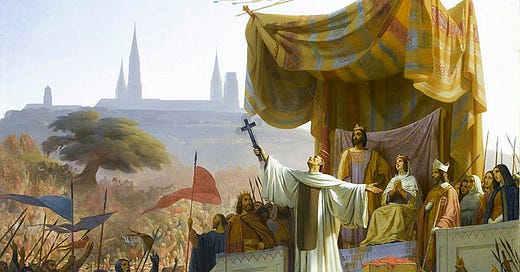Everyone associates the Second Crusade with Bernard of Clairvaux. He was the man who set the crusade in motion, but Bernard was not the first man to preach Crusade. Once news of Edessa's fall to the Muslims reached Europe, it was Pope Eugenius III, a former Cistercian monk, who issued the Quantum praedecessores.
The Quantum praedecessores was a written statement that issued a call to Holy War to help the Levantine Christians re-capture and restore the county of Edessa to Christian rule. It was issued in early December 1145 at the same time King Louis VII of France announced his intention of making the armed pilgrimage to the Holy Land at his Christmas court (Jotischky, 85). This would be the first crusade that witnessed the participation of the great monarchs of Europe.
The fact that Louis VII made his announcement around the same time Pope Eugenius released the Quantum praedecessores also suggests that Eugenius had been in communication with the monarchs before he wrote the Quantum praedecessores.
King Louis, a young monarch at the time, was most known for his piety. He was deeply moved by the news of Edessa's fate and so he fervently embraced the idea of leading an army to his Christian brethrens' aid in the Holy Land. Though, when he announced his intentions to all his leading nobles, he was met with an unenthusiastic response. However, when Pope Eugenius re-issued the Quantum praedecessores three months later, the response was unprecedented. Between 1146 and 1147, it circulated throughout Europe, "recited at numerous public assemblies and mass rallies," (Asbridge, 202).
It seemed like, only a half a decade later, history repeated itself. Pope Urban II's impassioned preaching of Holy War in Clermont that crisp November day in 1095 was still impressed upon the minds of many people and so, Pope Eugenius wanted to re-create that event. There was no doubt Eugenius held his predecessor in great admiration and so he wished to emulate his legacy.
As Pope Urban had done, Eugenius declared that he had a divine mandate. "It was God's divine Will, he made the call to Holy War," (Asbridge, 203). It was a just response to Muslim aggression. Edessa had been taken by the enemies of Christ. He described how "clerics had been killed and saintly relics trampled under the infidels' feet. These events were said to pose a great danger to all of Christianity," (Asbridge, 203).
Eugenius exhorted all Christian men capable of bearing arms to take up the cross and fight just as their forebears had done. "He promised all those who took up the cross absolution from all his sins of which he has made confession with a contrite and humble heart," (Asbridge, 204). He also promised that their wives, children, goods and possessions would be protected by the Church in their absence. Any legal suit regarding a crusader's property was banned until there was absolute certainty of his death. Furthermore, all interests on debts owed by a crusader were cancelled.
Given all these promises, Pope Eugenius's Quantum praedecessores should have gained momentum from the start, but it didn't for the following reasons: He delegated the task of preaching of Holy War to other clerics, namely to Bernard of Clairvaux, and although his promises were appealing, they didn't speak to the hearts of the people.
One reason that possibly explains Europe’s sluggish response to Eugenius’s Quantum praedecessores: in the mid-1140s, parts of Europe were embroiled in warfare. England was ravaged by a prolonged civil war between the Empress Matilda and Stephen of Blois. Meanwhile, the Germans on the northeastern reaches of the Holy Roman Empire (northeastern Germany), west of the Elbe River, were faced with persistent threats from the Wends. Those were reasons enough for people to readily dismiss the idea of Holy War in the Middle East.
So then, why was the response so widely enthusiastic a mere three months later?
Bernard of Clairvaux was the man who took Eugenius’s Quantum praedecessores and set the second crusade in motion. He possessed the same charisma and influence as had Pope Urban II. Whereas the Quantum praedecessores was issued in response to the fall of Edessa and focused primarily on the recapture of Edessa, Bernard’s vision for the crusade was people centered. He emphasized the sinfulness of Christians and blamed their sins for the loss of Edessa. “He offered the crusade as an opportunity for the knighthood to demonstrate its love for God and thereby to redeem itself,” (Jotischky, 85).
As had Pope Urban done half a century previous, Bernard addressed the issues of the times – repentance and eternal salvation – which spoke to the hearts of the people. Once more, warfare was reconciled with eternal salvation. In doing so, Bernard also appealed to knights’ quest for bravado and military might that can only be truly demonstrated on the battlefield.
As a result, many people took the cross in response to his preaching at King Louis VII’s court at Vezelay during Easter in 1146. Bernard was met with the same amount of enthusiasm when he preached at King Conrad III’s court in Germany.
To be continued…
Sources Used
Asbridge, Thomas. The Crusades: The Authoritative History of The War For The Holy Land. New York; Ecco, 2011.
Jotischky, Andrew. Crusading and the Crusader States. London and New York; Routledge, 2013.




